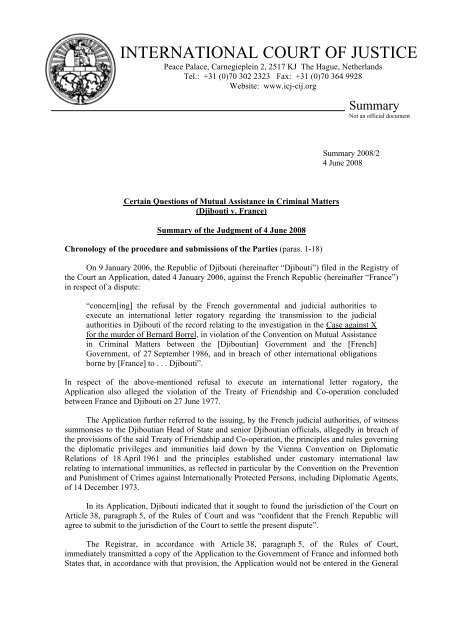Common Challenges Faced When Executing Letters Rogatory Requests
Common Challenges Faced When Executing Letters Rogatory Requests
Blog Article
Letters Rogatory Explained: Facilitating Legal Participation In Between Countries

Interpretation of Letters Rogatory
Letters rogatory are formal requests made by a court in one territory to a court in an additional territory, seeking support in getting evidence or testimony for a lawful case. This procedural device is vital in the context of global law, where lawful systems may differ, and cross-border participation is required. Letters rogatory assist in the celebration of info that might be crucial for adjudicating situations, particularly in circumstances involving complex global concerns.
Typically, these requests develop in civil, criminal, or management issues where an event needs proof that lies outside the territory of the asking for court. The letters work as a method to ensure that the principles of due process are supported, allowing courts to accessibility proof that could or else continue to be hard to reach due to geographic or legal obstacles.
The use of letters rogatory is governed by international treaties, bilateral agreements, or domestic regulations, which mark the treatments and commitments of the courts included. It is necessary to note that the execution of such requests is not assured; they depend on the legislations and methods of the jurisdiction receiving the letter. Thus, letters rogatory are an essential device for promoting legal collaboration and making sure justice throughout boundaries.
The Refine of Issuing Letters Rogatory
Issuing letters rogatory includes a structured procedure that makes sure compliance with both domestic and global lawful requirements. At first, the requesting celebration, commonly a court or lawful authority, drafts an official demand describing the nature of the aid looked for, the evidence or details needed, and the lawful basis for the demand. This document has to be precise to assist in understanding by the foreign territory.

The next step involves transferring the letters rogatory to the assigned international authority. This is commonly done with diplomatic channels or worldwide legal aid frameworks, ensuring that the request is obtained and acknowledged by the foreign court. The international court after that refines the demand according to its very own legal procedures, eventually reacting to the asking for celebration with the in-demand information or evidence, hence facilitating worldwide legal teamwork.
Significance in International Regulation
The importance of letters rogatory in worldwide law can not be overstated, as they function as a crucial system for judicial cooperation throughout borders. These official requests for help in lawful matters enable courts in one jurisdiction to seek details, evidence, or the visibility of witnesses from one more jurisdiction, thus facilitating the administration of justice in transnational situations.
Letters rogatory are particularly crucial in the context of globalization, where lawful disagreements often cover several countries. They make it possible for the collection of evidence that may or else be unattainable, making sure that legal proceedings are notified and fair. By promoting collaboration between judicial systems, letters rogatory help maintain the policy of legislation and advertise common regard amongst countries.
Additionally, the usage of letters rogatory demonstrates a dedication to international norms and concepts of participation, mirroring the interconnected nature of modern-day legal practices. It illustrates the value of adhering to established treatments and treaties, such as the Hague Convention, which gives a framework for these demands - Letters rogatory. Eventually, letters rogatory improve the efficiency of legal procedures, making sure that justice is not hindered by geographical boundaries
Obstacles and Limitations
Despite their significance, letters rogatory face a number of obstacles and restrictions that can impede their effectiveness. One key issue is the varying legal frameworks and treatments throughout jurisdictions, which can bring about misconceptions and delays in the this contact form implementation of demands. Various countries may have distinct demands for the credibility of letters rogatory, making complex the procedure even more.
Furthermore, the usually protracted nature of global legal cooperation can impede prompt access to proof or witnesses. This delay might adversely impact legal procedures or recurring investigations, specifically in instances needing immediate activity. The lack of resources and training in some jurisdictions can result in inadequate handling of demands, leading to insufficient or insufficient actions.
Social differences and differing mindsets towards lawful procedures can also position considerable obstacles. As an example, nations with much less official legal systems may have a hard time to abide with the procedural rigor expected in letters rogatory. Lastly, political tensions in between countries can influence the desire to perform demands, leading to a lack of cooperation and lessening the energy of this mechanism in international regulation. These obstacles necessitate continual dialogue and reform to boost the efficiency of letters rogatory in lawful teamwork.
Study and Instances

Conversely, challenges can arise, as seen in a situation involving a European nation looking for proof in an ongoing criminal matter from a non-EU nation - Letters rogatory. The procedure was delayed as a result of administrative hurdles and differing lawful standards, eventually preventing the examination
These instances illustrate that while letters rogatory can promote international cooperation and expedite legal procedures, they additionally highlight the need for clear interaction and understanding of lawful structures in between nations. Such study highlight the value of refining this device to boost effectiveness and effectiveness in global lawful matters.
Conclusion
In summary, letters rogatory offer as a crucial system for assisting in legal teamwork between nations, making sure the collection of evidence and testimony across territories. Their value in worldwide legislation can not be overstated, as they advertise due procedure and boost the efficiency of cross-border lawful process.
Letters rogatory are formal requests made by a court in one territory to a court in one more jurisdiction, seeking assistance in acquiring evidence or testimony for a legal proceeding. The requesting celebration, normally a see post court or lawful authority, drafts a formal demand describing the nature of the aid looked for, the proof or details required, and the legal basis for the demand. The international court then refines the request according to its very own lawful treatments, eventually reacting to the asking for celebration with the popular details or evidence, therefore helping with worldwide legal cooperation.
Moreover, the use of letters rogatory shows a dedication to global norms and principles of collaboration, showing the interconnected nature of modern legal techniques.Worldwide lawful teamwork through letters rogatory is not without its real-world ramifications, as shown by different situation researches that highlight both challenges and successes.
Report this page